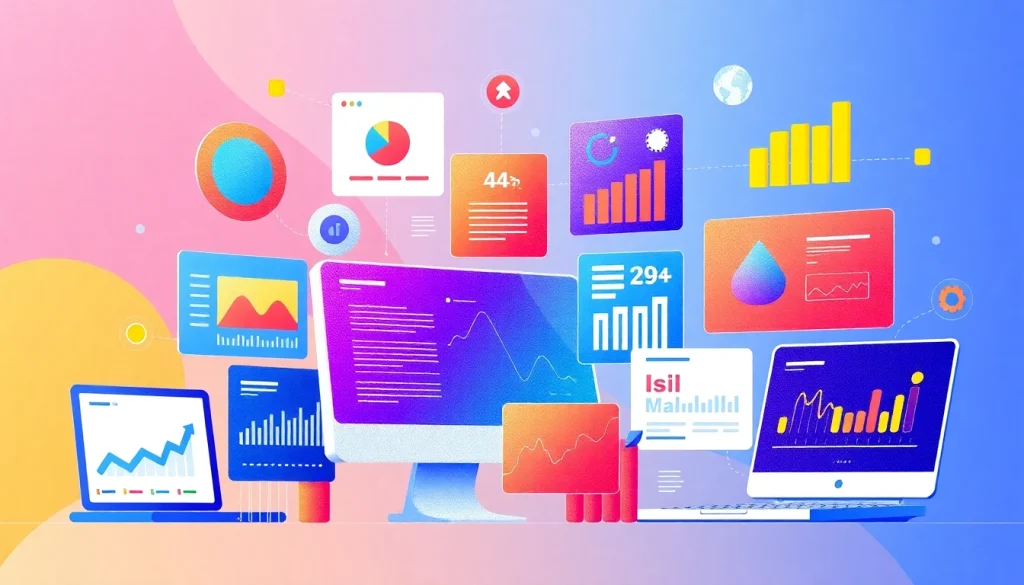
Understanding AI Marketing Tools
In today’s competitive digital landscape, businesses are continually searching for innovative strategies to improve their marketing efforts. One of the most transformative advancements in recent years has been the development of AI marketing tools. These sophisticated instruments leverage artificial intelligence to enhance various aspects of marketing, from data analysis to content creation and customer engagement. As we delve into the realm of AI marketing tools, we will explore their definition, the significance of automation in marketing, and the numerous benefits they offer businesses.
What Are AI Marketing Tools?
AI marketing tools are software solutions powered by artificial intelligence that assist marketers in optimizing and automating their campaigns. These tools analyze vast amounts of data to identify patterns, predict consumer behavior, and tailor marketing messages for maximum effectiveness. Common applications include customer segmentation, content generation, predictive analysis, and performance tracking, enabling businesses to make data-driven decisions that enhance their marketing strategies.
The Role of Automation in Marketing
Automation is a critical component of AI marketing tools. By automating repetitive tasks such as email marketing, social media scheduling, and data analysis, marketers can reclaim valuable time and focus on high-level strategic initiatives. This automation doesn’t just increase efficiency; it also reduces human error, ensures consistency, and allows for more personalized marketing strategies. As automation continues to evolve, its integration with AI technologies will enable even greater enhancements in targeting and engagement.
Benefits of Using AI in Marketing Strategies
- Enhanced Decision Making: AI tools analyze data trends and consumer behavior, providing insights that help marketers make informed decisions about strategy and resource allocation.
- Personalization: Businesses can utilize AI to create highly personalized experiences, tailoring content and offers to individual customer preferences, thereby boosting engagement and satisfaction.
- Efficiency: Automation of repetitive tasks reduces manual effort, allowing teams to focus on creative and strategic endeavors.
- Cost Savings: By streamlining processes, businesses can cut down on operational costs associated with marketing campaigns.
- Improved Performance Tracking: AI tools provide robust analytics capabilities, allowing businesses to measure the effectiveness of their marketing strategies in real time and adjust accordingly.
Top AI Marketing Tools to Consider
As the landscape of AI marketing continues to evolve, numerous tools have emerged that cater to various aspects of marketing. Here, we highlight some of the most innovative and effective AI marketing tools available.
Tools for Content Generation
Content is the cornerstone of any successful marketing strategy, and AI tools have significantly innovated how content is created and optimized. Some of the leading tools in this domain include:
- Jasper: This AI-powered writing assistant helps marketers and writers generate high-quality content quickly and efficiently. Jasper uses natural language processing to understand context and produce relevant text.
- Copy.ai: Ideal for creating marketing copy, blog posts, and social media content, Copy.ai utilizes machine learning to generate engaging content based on user inputs.
- Grammarly: Though primarily known for grammar checks, Grammarly also offers AI-powered suggestions for improving style and tone, ensuring that content resonates with its intended audience.
AI Solutions for Social Media Management
Managing social media presence effectively can be daunting, but AI tools simplify this process. Here are some tools that stand out:
- Buffer: An intuitive social media management tool that leverages AI to suggest optimal posting times and automatically generate hashtags.
- Later: This tool allows users to schedule and manage visual content across multiple platforms. Its AI-driven features help identify the best performing content based on analytics.
- Hootsuite: Renowned for social media management, Hootsuite also uses AI to streamline scheduling and content distribution while providing valuable insights into audience engagement.
Predictive Analytics Platforms
Predictive analytics is an area where AI shines, allowing businesses to forecast outcomes based on historical data. Key players include:
- HubSpot: This comprehensive marketing platform offers robust predictive analytics tools that assist in lead scoring and campaign optimization.
- Google Analytics: The integration of AI into Google Analytics has enhanced its capabilities, providing businesses with data-driven insights that predict user behavior.
- Tableau: This powerful visualization platform also features predictive analytics, allowing marketers to visualize trends and forecast strategies effectively.
Integrating AI Marketing Tools into Your Business
Adopting AI marketing tools requires careful planning and execution to ensure they align with your overall business goals. Here are steps to effectively integrate AI tools into your marketing strategy.
Choosing the Right Tools for Your Needs
Before diving into implementation, businesses must assess their needs and identify tools that will add the most value. Consider the following criteria:
- Specific Features: Look for tools that specialize in the areas where you require assistance, whether it’s content generation, social media management, or analytics.
- User-Friendliness: Ensure the tools are intuitive and user-friendly to reduce the learning curve for your team.
- Integration: Evaluate whether the tools can seamlessly integrate with your existing systems to enhance workflow efficiency.
Steps for Implementing AI Tools
- Conduct Research: Investigate different AI tools, read reviews, and request demos to understand their capabilities.
- Create a Strategy: Formulate a clear strategy that outlines how the AI tools will be utilized, including defining key performance indicators (KPIs).
- Train Your Team: Ensure your marketing team is well-versed in the functionality of the AI tools through training sessions and resources.
- Start Small: Begin with limited implementations to gauge effectiveness before scaling up the use of AI tools across your campaigns.
Measuring Success and Performance Metrics
To determine the effectiveness of your AI marketing tools, it’s crucial to establish metrics for evaluation. Consider measuring:
- Engagement Rates: Analyze how content generated by AI tools performs in terms of user engagement, including likes, shares, and comments.
- Conversion Rates: Monitor the percentage of leads converted into customers to assess the efficacy of AI-driven campaigns.
- Customer Satisfaction: Gather feedback from customers to determine their satisfaction with personalized marketing efforts.
Case Studies of Successful AI Marketing Implementations
Examining real-world examples of how brands have successfully integrated AI marketing tools can provide valuable insights for your strategy.
Industry Examples of AI Marketing
Several companies have leveraged AI marketing tools to revolutionize their strategies:
- Netflix: By utilizing AI for personalized recommendations, Netflix has significantly increased viewer retention and engagement, tailoring content suggestions based on user data.
- Sephora: Sephora uses AI-powered chatbots on its website to assist customers in finding products, substantially enhancing the customer shopping experience.
- Amazon: Through sophisticated AI algorithms, Amazon personalizes the shopping experience by suggesting products based on previous purchases and browsing history.
Common Challenges & How to Overcome Them
While integrating AI tools can yield substantial benefits, businesses should be aware of potential challenges, including:
- Data Quality: Poor-quality data can lead to inaccurate insights. Ensuring data cleanliness and accuracy is essential before implementing AI tools.
- Resistance to Change: Employees may resist new technologies. Providing education and showcasing the benefits of AI tools can help mitigate this issue.
- Cost: The initial investment for AI tools can be high. Prioritize tools that offer the best ROI and explore budget-friendly options to start.
Lessons Learned from Leading Brands
Several key lessons emerge from studying successful AI marketing implementations:
- Prioritize Customer Experience: Always design AI implementations with the customer in mind to enhance satisfaction and loyalty.
- Iterate and Improve: Use insights gained from AI tools to continually optimize and iterate on marketing strategies.
- Be Prepared to Adapt: As AI technology evolves, remain flexible and open to adopting new tools and processes that can further enhance marketing efforts.
The Future of AI in Marketing
As technology progresses, the role of AI in marketing will only expand. It is essential for businesses to stay informed about upcoming trends and developments to harness the full potential of AI marketing tools.
Trends to Watch
Several emerging trends are shaping the future of AI in marketing:
- Increased Personalization: Brands will continue to refine personal marketing strategies that utilize AI for in-depth customer analysis and tailored experiences.
- Voice Search Optimization: With the rise of voice-activated devices, optimizing content for voice search through AI will become crucial.
- Data Privacy Considerations: As concerns around data privacy grow, brands will need to balance personalization with responsible data management practices.
The Evolving Landscape of Marketing Tools
The marketing technology stack is continuously evolving, with AI tools emerging as essential components of a modern marketing strategy. Businesses must adapt by integrating these tools into their operational frameworks, ensuring they remain competitive in an increasingly data-driven world.
Preparing for AI Developments in Your Strategies
To prepare for the future of AI in marketing, organizations should focus on:
- Continuous Learning: Encourage a culture of continuous learning and adaptability within marketing teams to keep pace with AI developments.
- Invest in Training: Provide ongoing training for employees on the latest AI tools and technologies to empower them to leverage these innovations effectively.
- Collaborative Strategies: Foster collaboration between different departments to create integrated marketing strategies that use AI insights holistically.





